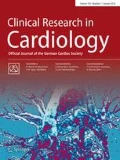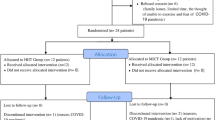Abstract
Purpose
To compare the effects of home-based and hospital-based exercise programs on exercise capacity, quality of life, psychological symptoms, and hemodynamic parameters in heart failure (HF) patients.
Methods
Seventy-four patients were randomized into either a hospital-based exercise (Group 1) or a home-based exercise (Group 2) group. Prior to and after the 8-week rehabilitation program, the two groups were compared with respect to their functional capacity [maximal oxygen uptake (pVO2) and 6-min walk test (6MWT)], quality of life (Medical Outcomes Study and the 36-item Short Form Survey, SF-36), psychological symptoms [Beck Depression Inventory (BDI) and State-Trait Anxiety Inventory], and hemodynamic parameters [(left ventricular diastolic diameter in diastole, left ventricular diameter in systole, Mitral Early diastolic peak flow velocity (E)/late diastolic peak flow velocity (A), Mitral E/Mitral early peak velocity (E m), Tei index, right ventricular systolic peak velocity (S m), tricuspid annular plane systolic excursion, systolic pulmonary arterial pressure (SPAP), and left and right ventricular ejection fraction (LVEF and RVEF)].
Results
After the exercise programs, significant improvement was observed in pVO2, 6MWT and subscales of physical function, general health, and vitality of SF 36, as well as BDI and LVEF in both groups (P < 0.05). A comparison of the two exercise groups revealed no significant differences between them regarding the analyzed variables (P > 0.05).
Conclusion
Both the hospital-based and home-based exercise groups improved significantly in functional capacity, quality of life, depression symptoms, and LVEF. Based on these results, we believe that physicians can recommend home-based exercise under strict supervision for stable HF patients. However, additional research should be conducted in this area.

Similar content being viewed by others
References
Hunt SA, Baker DW, Chin MH, Cinquegrani MP, Feldman AM, Francis GS, Ganiats TG, Goldstein S, Gregoratos G, Jessup ML, Noble RJ, Packer M, Silver MA, Stevenson LW, Gibbons RJ, Antman EM, Alpert JS, Faxon DP, Fuster V, Gregoratos G, Jacobs AK, Hiratzka LF, Russell RO, Smith SC Jr (2001) ACC/AHA guidelines for the evaluation and management of chronic heart failure in the adult: executive summary a report of the American College of Cardiology/American Heart Association task force on practice guidelines (committee to revise the 1995 guidelines for the evaluation and management of heart failure): developed in collaboration with the International Society for Heart and Lung Transplantation; endorsed by the Heart Failure Society of America. Circulation 104:2996–3007
Whellan DJ, O’Connor CM, Lee KL, Keteyian SJ, Cooper LS, Ellis SJ, Leifer ES, Kraus WE, Kitzman DW, Blumenthal JA, Rendall DS, Houston-Miller N, Fleg JL, Schulman KA, Piña IL (2007) Heart failure and a controlled trial investigating outcomes of exercise training (HF-ACTION): design and rationale. Am Heart J 153:201–211
Working Group on Cardiac Rehabilitation & Exercise Physiology and Working Group on Heart Failure of the European Society of Cardiology (2001) Recommendations for exercise training in chronic heart failure patients. Eur Heart J 22:125–135
Belardinelli R, Georgiou D, Cianci G, Purcaro A (1999) Randomized, controlled trial of long-term moderate exercise training in chronic heart failure: effects on functional capacity, quality of life, and clinical outcome. Circulation 99:1173–1182
Braith RW, Welsch MA, Feigenbaum MS, Kluess HA, Pepine CJ (1999) Neuroendocrine activation in heart failure is modified by endurance exercise training. J Am Coll Cardiol 34:1170–1175
Coats AJ, Adamopoulos S, Radaelli A, McCance A, Meyer TE, Bernardi L, Solda PL, Davey P, Ormerod O, Forfar C (1992) Controlled trial of physical training in chronic heart failure. Exercise performance, hemodynamics, ventilation, and autonomic function. Circulation 85:2119–2131
Haykowsky MJ, Liang Y, Pechter D, Jones LW, McAlister FA, Clark AM (2007) A meta-analysis of the effect of exercise training on left ventricular remodeling in heart failure patients: the benefit depends on the type of training performed. J Am Coll Cardiol 49:2329–2336
van Tol BA, Huijsmans RJ, Kroon DW, Schothorst M, Kwakkel G (2006) Effects of exercise training on cardiac performance, exercise capacity and quality of life in patients with heart failure: a meta-analysis. Eur J Heart Fail 8:841–850
Okin PM, Ameisen O, Kligfield P (1986) A modified treadmill exercise protocol for computer-assisted analysis of the ST segment/heart rate slope: methods and reproducibility. J Electrocardiol 19:311–318
American College of Sports Medicine (1990) The recommended quantity and quality of exercise for developing and maintaining cardiorespiratory and muscular fitness in healthy adults. Med Sci Sports Exerc 22:265–274
Shimizu M, Myers J, Buchanan N, Walsh D, Kraemer M, McAuley P, Froelicher VF (1991) The ventilatory threshold: method, protocol, and evaluator agreement. Am Heart J 122:509–516
Guyatt GH, Sullivan MJ, Thompson PJ, Fallen EL, Pugsley SO, Taylor DW, Berman LB (1985) The 6-minute walk: a new measure of exercise capacity in patients with chronic heart failure. Can Med Assoc J 132:919–923
Trust MedicalOutcomes (1994) How to score SF-36 health survey, 2nd edn. Medical Outcomes Trust, Boston
Beck AT, Stear RA, Garben MG (1985) Psychometric properties of the beck depression inventory: twenty-five years of evaluation. The Beck depression inventory, 2nd edn. Houghton Mifflin, Boston
Spielberger CD, Gorsuch RL, Lushene RE (1970) Manual for the State-Trait Anxiety Inventory. Consulting Psychology Press, Palo Alto
Sahn DJ, DeMaria A, Kisslo J, Weyman A (1978) Recommendations regarding quantitation in M-mode echocardiography: results of a survey of echocardiographic measurements. Circulation 58:1072–1083
Schiller NB, Shah PM, Crawford M, DeMaria A, Devereux R, Feigenbaum H, Gutgesell H, Reichek N, Sahn D, Schnittger I (1989) Recommendations for quantitation of the left ventricle by two-dimensional echocardiography. American Society of Echocardiography Committee on Standards, Subcommittee on Quantitation of Two-Dimensional Echocardiograms. J Am Soc Echocardiogr 2:358–367
Keteyian SJ (2006) Exercise rehabilitation in chronic heart failure. Coron Artery Dis 17:233–237
Jónsdóttir S, Andersen KK, Sigurosson AF, Sigurosson SB (2006) The effect of physical training in chronic heart failure. Eur J Heart Fail 8:97–101
Kulcu DG, Kurtais Y, Tur BS, Gülec S, Seckin B (2007) The effect of cardiac rehabilitation on quality of life, anxiety and depression in patients with congestive heart failure. A randomized controlled trial, short-term results. Eura Medicophys 43:489–497
Friedmann E, Thomas SA, Liu F, Morton PG, Chapa D, Gottlieb SS, Sudden Cardiac Death in Heart Failure Trial Investigators (2006) Relationship of depression, anxiety, and social isolation to chronic heart failure outpatient mortality. Am Heart J 152:940.e1–940.e8
Klocek M, Kubinyi A, Bacior B, Kawecka-Jaszcz K (2005) Effect of physical training on quality of life and oxygen consumption in patients with congestive heart failure. Int J Cardiol 103:323–329
Miche E, Roelleke E, Wirtz U, Zoller B, Tietz M, Huerst M, Radzewitz A (2008) Combined endurance and muscle strength training in female and male patients with chronic heart failure. Clin Res Cardiol 97:615–622
Dracup K, Evangelista LS, Hamilton MA, Erickson V, Hage A, Moriguchi J, Canary C, MacLellan WR, Fonarow GC (2007) Effects of a home-based exercise program on clinical outcomes in heart failure. Am Heart J 154:877–883
Belardinelli R, Georgiou D, Cianci G, Berman N, Ginzton L, Purcaro A (1995) Exercise training improves left ventricular diastolic filling in patients with dilated cardiomyopathy. Clinical and prognostic implications. Circulation 91:2775–2784
Yu CM, Li LS, Lam MF, Siu DC, Miu RK, Lau CP (2004) Effect of a cardiac rehabilitation program on left ventricular diastolic function and its relationship to exercise capacity in patients with coronary heart disease: experience from a randomized, controlled study. Am Heart J 147:e24
Sullivan MJ, Higginbotham MB, Cobb FR (1998) Exercise training in patients with severe left ventricular dysfunction. Hemodynamic and metabolic effects. Circulation 78:506–515
McKelvie RS, Teo KK, Roberts R, McCartney N, Humen D, Montague T, Hendrican K, Yusuf S (2002) Effects of exercise training in patients with heart failure: the exercise rehabilitation trial (EXERT). Am Heart J 144:23–30
Erbs S, Linke A, Gielen S, Fiehn E, Walther C, Yu J, Adams V, Schuler G, Hambrecht R (2003) Exercise training in patients with severe chronic heart failure: impact on left ventricular performance and cardiac size. A retrospective analysis of the Leipzig Heart Failure Training Trial. Eur J Cardiovasc Prev Rehabil 10:336–344
Giannuzzi P, Temporelli PL, Corrà U, Tavazzi L (2003) Antiremodeling effect of long-term exercise training in patients with stable chronic heart failure: results of the exercise in left ventricular dysfunction and chronic heart failure (ELVD-CHF) trial. Circulation 108:554–559
Maiorana A, O’Driscoll G, Taylor R, Green D (2003) Exercise and the nitric oxide vasodilator system. Sports Med 33:1013–1035
Acknowledgment
We have no support for this study.
Author information
Authors and Affiliations
Corresponding author
Rights and permissions
About this article
Cite this article
Karapolat, H., Demir, E., Bozkaya, Y.T. et al. Comparison of hospital-based versus home-based exercise training in patients with heart failure: effects on functional capacity, quality of life, psychological symptoms, and hemodynamic parameters. Clin Res Cardiol 98, 635–642 (2009). https://doi.org/10.1007/s00392-009-0049-6
Received:
Accepted:
Published:
Issue Date:
DOI: https://doi.org/10.1007/s00392-009-0049-6




